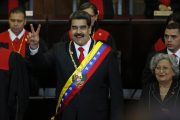
Thousands of union workers are striking today in the streets of Buenos Aires in protest of libertarian President Javier Milei’s economic agenda.
Although more than one quarter of Argentina’s workforce is unionized, Milei’s victory in last fall’s presidential runoff election was so overwhelming some say that the 12-hour strike is unlikely to be effective.
Jimena Blanco, head of Verisk Maplecroft, a global risk intelligence company, said that “the general strike is more of a political test for the labor unions than for Milei,” adding,
Regardless of attendance, the strike caters to the unions’ own support base and, at this stage, is not representative of wider social sentiment.
This was confirmed by Nicolas Saldias, a senior analyst at another global risks assessment company, the Economist Intelligence Unit: “I think many Argentinians will not interpret the strike favorable as it is too soon and the union leaders are extremely unpopular with the wider public.”
He added:
The government was wise to leverage its honeymoon period to fast-track its reforms and [make] important progress on its legislative agenda as there is still goodwill among non-Peronist parties.
That “legislative agenda” is right out of the Austrian School of Economics playbook: slashing government jobs, eliminating government agencies, threatening to rid the country of its central bank, and privatizing public pension plans. He has also removed rent controls and price controls on certain consumer goods that the previous administration had installed in a failed attempt to cut inflation.
That agenda is being driven by citizen-voters who are grappling with an annual inflation rate of more than 200 percent and a poverty rate that has put four out of every 10 Argentinians below the poverty level.
Milei’s government isn’t being intimidated, threatening to dock every government union member’s pay for participating in the protest, and setting up a hotline to allow reports of union organizer intimidation to go to law-enforcement agencies.
Milei warned the citizens in December that his “shock therapy” would likely have an immediate impact on the economy but that the previous administrations had left him with no other options:
We don’t have margin for sterile discussions. Our country demands action, and immediate action.
The political class left our country at the brink of its biggest crisis in history.
We don’t desire the hard decision that will need to be made in coming weeks, but lamentably they didn’t leave us any option.
Milei won the runoff election on a platform that was distinctly anti-establishment, gaining public attention and approbation by bringing a chainsaw with him to public appearances to illustrate his political position. It didn’t hurt that his public personality was attractive to the general public.
He supports the private ownership of firearms, is adamantly pro-life, has described climate change as “a socialist lie,” and public school students as “hostages of a system of state indoctrination.”
Milei, an economist by training and an economic realist by experience, spelled out his Austrian School ideology in a January 17 speech he made at the World Economic Forum (WEF) in Davos, Switzerland.
He immediately called out the statists attending the event:
We are here to tell you that collectivist experiments are never the solution for the problems that beset the people of the world, but, to the contrary, they are the cause.
Believe me: there is nobody better than us Argentines to bear testimony to these two points. When we adopted the model of liberty, around the year 1860, within 35 years we had become a leading world power, whereas once we embraced collectivism, over the last 100 years, we saw how our citizens began to be systematically impoverished, falling eventually to the 140th spot in the world.
He then provided those worthies a history lesson:
If we consider the history of economic progress, we can see how, from the year 0 to the year 1800, approximately, the world GDP per capita stayed almost the same throughout that entire period.
If one looks at a graph of economic growth during all of human history, one would be looking at a graph resembling a hockey stick, an exponential function that stayed constant during 90 percent of the time, and took off exponentially beginning in the 19th century…
[D]uring the entire period from the year 0 to the year 1800, the global GDP per capita remained stagnant. Well, not only did capitalism generate an explosion of wealth from the moment it was adopted as an economic system, but also, if one also analyzes the data, what one observes is that the growth is accelerating across that whole period.
During the whole period covered from the year 0 to the year 1800, the rate of growth of GDP per capita remained stable at about 0.02 percent annually, that is to say, practically without growth.
Starting with the 19th century and the Industrial Revolution, the compound annual rate of growth was 0.66 percent, and doubled the per capita GDP after 107 years.
Now, if we look at the period from 1900 to 1950, the rate of growth accelerates to 1.36 percent annually. Now we don’t need 107 years to double the GDP per capita, but only 66 years.
And if we take the period from 1950 to 2000, we see that the rate of growth was 2.1 percent annually, from which we can infer that only 33 years are necessary to double the world GDP per capita.
This trend, far from stopping, continues even today. If we take the period from 2000 to 2023, the rate of growth reached three percent annually, which implies that we can double the world GDP per capita in only 23 years.
If we study the GDP per capita from the year 1800 until now, what is observed is that, after the Industrial Revolution, the GDP per capita increased more than fifteenfold, generating an explosion of wealth that lifted 90 percent of the world population out of poverty.
We should never forget that, in the year 1800, around 95 percent of the world population lived in extreme poverty, while that figure fell to five percent by the year 2020.
Then he turned from teacher to preacher, calling out those attending the WEF conference for supporting “social justice” and attacking the free market:
The conclusion is obvious: far from being the cause of our problems, capitalism and free enterprise as an economic system is the only tool that we have to end hunger, poverty, and indigence all across the planet. The empirical evidence is unquestionable.
That’s why, since there’s no doubt that capitalism and the free market are superior in productive terms, the Leftist creed attacks capitalism on moral grounds, saying — according to its detractors — that it’s unjust.
They say that capitalism is evil because it’s individualistic, and that collectivism is good because it’s altruistic (of course, with the money of others!).
So they advocate for “social justice.” But this concept, which has become fashionable in the developed world in recent times, in my country it’s been a constant in political discussions for more than 80 years.
The problem is that social justice is not just, nor does it improve the general well-being. Very much to the contrary, it is an intrinsically unjust idea, because it’s violent. It’s unjust because the state is funded by taxes, and taxes are levied in a coercive manner … This means that the state is funded coercively, and that, the greater the tax burden, the greater the coercion, and the lesser the freedom.
How successful Milei will be in tossing out the statist economic model that has driven Argentina into the ground and replacing it with common sense, free-market policies remains to be seen. His personal magnetism hasn’t yet translated itself into majorities in the government, and some of his early policies have been stymied in the courts.
But to the average Argentinian, despite the union protestors marching today to the capitol in Buenos Aires, Milei is a hero and they’re willing to give him and his policies time to bear fruit.
Related articles:
“Collectivist Experiments Are Never the Solution”: Javier Milei’s Full Davos Speech
Javier Milei at the WEF — Attacking Socialism, Defending Monopolists?
Argentina’s Milei Cuts 5,000 Government Jobs
Libertarian Javier Milei Wins Argentina’s Presidential Election
Establishment Shaken by Libertarian Candidate’s Victory in Argentina’s Presidential Primary




